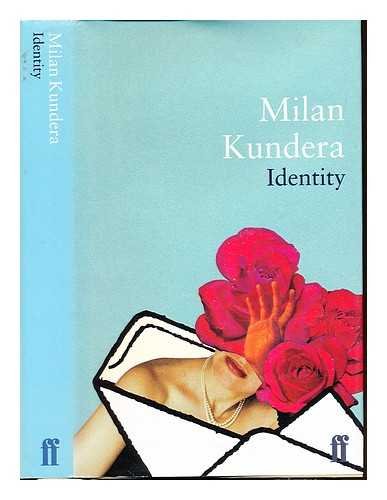Identity - Softcover

"synopsis" may belong to another edition of this title.
The plot is simple: Jean-Marc arrives at the hotel; Chantal is out walking. Near misses and mistaken identities characterize his frantic search for her, offering Kundera the opportunity to philosophize on the unknowability of the "other." They reunite; Chantal blurts out the distressing thought that's plagued her day: "Men don't turn to look at me anymore." This launches the protagonists into sketchy flashbacks, stilted dialogues, and interior monologues, all loosely bound by their embarkation on an erotic journey.
Key bits from the characters' pasts become signature refrains. Chantal, for example, has buried a son, who died at the age of 5. Strands such as this are dropped lightly in the narrative, to be pulled through later chapters like a needle with different colored threads. Later, for example, the boy's death will trigger her unpleasant realization--that it was, in the end, a "dreadful gift." Children, she thinks, keep us hopeful in the world, because "it's impossible to have a child and despise the world as it is; that's the world we've put the child into." Thus, her child's death has set her free to live out her genuine disdain of the world. Although the illogical extremes of Kundera's thought can be wildly dissonant and wondrously shocking, this reiterative device of Identity lacks energy. There's no sense of discovery about these characters. They remain flat; the style effects one like an Ingmar Bergman film when one is in the mood for Sam Peckinpah.
As if in serendipitous response to her pain in getting older, Chantal receives an anonymous "love" note. More notes follow. Will they prove Jean-Marc's attempt to sweeten her sad disclosure? Her sexual awakening begins to blur the boundaries of what's real. All well and good, but somewhere along the line, Kundera concludes that Chantal is weak because she's older. Age, we are asked to believe, becomes a wedge between the lovers, even though Chantal is only a few years older than Jean-Marc, who is himself only 42. And in the exploration of her sexuality on the wax and wane, Kundera succumbs to cliché: she is consumed too often by too many flames, and red is all used up as a symbol of violent passion. On the subject of male and female desire, Kundera is incomparably funny, and the novel sports some nervy images--masturbating fetuses; our human community joined in a sea of saliva; the ubiquity of spying eyes, harvesting information for profit; the human gaze itself, a marvel, jaggedly interrupted by the mechanical action of the blink. Kundera betrays a witty revulsion for the values and mores of the late 20th century.
But with sentences such as, "This is the real and the only reason for friendship: to provide a mirror so the other person can contemplate his image from the past, which, without the eternal blah-blah of memories between pals, would long ago have disappeared," the reading experience reduces to an annoyance. Perhaps this is the fault of the translator attempting a breezy, colloquial tone. But it's sloppy and careless. Still the novel's an entertainment, a good companion. Reading it is like passing an afternoon in a sidewalk café, catching up with an old friend, say, with whom one has shared youthful cynicism and diatribes against the ignominies of human behavior. One will look back on such an afternoon and remember too many Galloises smoked, too many cups of coffee, moments of intense engagement that fell, alas, into the indulgence of a "retro" ennui.
Milan Kundera is the author of the novels The Joke, Farewell Waltz, Life Is Elsewhere, The Book of Laughter and Forgetting, The Unbearable Lightness of Being, and Immortality, and the short-story collection Laughable Loves—all originally written in Czech. His most recent novels Slowness, Identity, and Ignorance, as well as his nonfiction works The Art of the Novel, Testaments Betrayed, The Curtain, and Encounter, were originally written in French.
"About this title" may belong to another edition of this title.
- PublisherFaber
- Publication date1998
- ISBN 10 0571195342
- ISBN 13 9780571195343
- BindingPaperback
- Edition number1
- Number of pages152
- Rating
Buy New
Learn more about this copy
Shipping:
FREE
Within U.S.A.
Top Search Results from the AbeBooks Marketplace
Identity
Book Description Paperback. Condition: New. Seller Inventory # Abebooks137328

